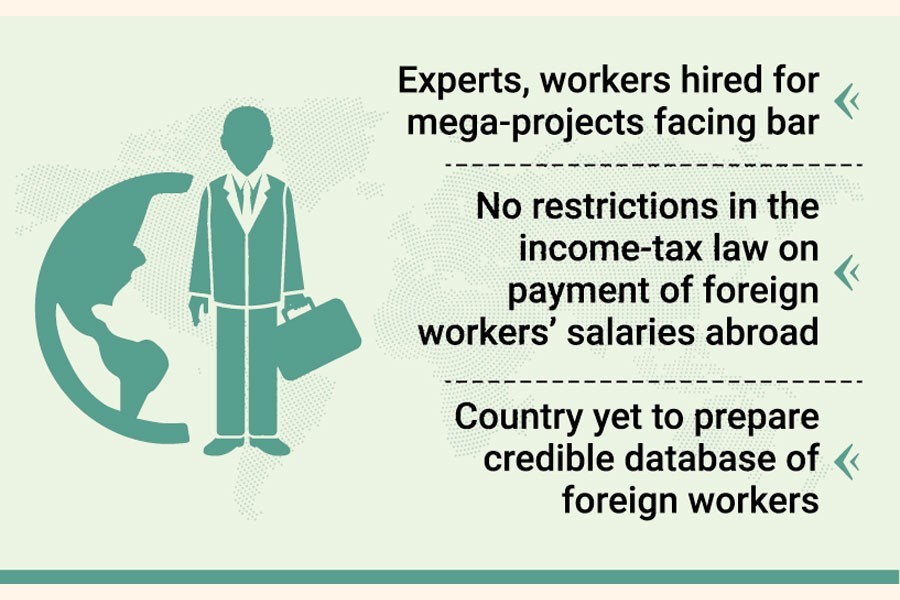An official move gets underway to facilitate foreign nationals in Bangladesh to send home 75 per cent of their pay and perks by bending legal limitations, sources said.
The initiative comes from Bangladesh Investment Development Authority (BIDA) as it feels the necessity in the current context especially as many foreign experts work for major development projects.
For creating the wider window in this respect, BIDA revisits the Guidelines for Foreign Exchange Transactions (GFET) of Bangladesh Bank and moves for a remedy.
They said the move is prompted by the fact that the foreign experts hired for country's mega-projects, including Padma Bridge and Metrorail, faced complexities in transferring their earnings.
The investment-promotion authority will sit today (Wednesday) with the stakeholders, including the central bank and the National Board of Revenue (NBR) to settle this issue.
A senior official of the BIDA said the policy allowing foreign employees to send their salaries to home countries should be relaxed for the sake of smooth implementation of the mega-projects.
"Our neighbouring countries have relaxed provisions for foreign employees than that of ours," he said.
Terms of different development projects have been set as per the requirements of relevant parties, he pointed out to substantiate the grounds cited for the move.
"Implementation of those projects is being hampered due to the existing rules of outward remittance," he said.
Complying with the BB rules is difficult for the foreign officials, especially for those working on hi-tech or at top level in Padma Bridge, Rampal or Metrorail and other mega-projects.
Flexibility in rules is needed to expedite work of the priority projects, he added.
Financing companies pay salary to the main company abroad as per contract. And this move has been made to explore the possibility of allowing the foreign employees to receive payments in their respective home country, he explained.
Under different terms and conditions, development partners sometimes need to clear payments abroad to the main contracting parties, he further said.
According to BB outward-remittance rules, foreign employees have to receive payment of their salaries and perks in Bangladesh.
The chapter 11 (section 8) of the FEPD's Guidelines for Foreign Exchange Transactions 2018 (Vol-1) permits foreign nationals working in Bangladesh with valid work permits to transfer remittances up to 75 per cent of their net income.
It allows expatriate employees to send their income by converting taka to equivalent foreign currency to FC accounts maintained and operated in compliance with the GFET of the central bank.
However, the foreign employees must have valid work permits.
Earlier, local employers had to deposit salaries of their hired foreign staff members to their banks in taka accounts.
The foreign employees concerned had to remit any fund to their native countries by telegraphic transfer (TT) after converting those to currencies of their preferences.
A senior official of BB said the BIDA has sought opinion of BB on this matter.
"Discussion with all stakeholders including tax authority is needed to decide on this issue," he said.
An income-tax official said there is no restriction in the taxing law on method of payment of salaries and perks of foreign employees abroad.
The employers' foreign employees have to deduct 30 percent tax at source before payment of their salaries if they are not entitled to have exemption, he said.
They must, however, give a declaration to the tax authority on payment of salaries to the foreign nationals.
There are no specific data as to how many foreign workers are employed in the country's big projects, undertaken particularly for building infrastructures with foreign financing and foreign companies executing those.
All major steps taken by government agencies to check illegal employment of and tax evasion by foreign nationals and to prepare a database of such people have remained mostly on paper even after more than half a decade.
Though there are no formal or institutional figures of foreigners working in the country, various estimates say the number is between 0.5 million and 1.0 million.
Some 10,000 foreign workers submit their tax returns.
Earlier, Home Minister Asaduzzaman Khan had told parliament that 85,486 foreigners from 44 countries were legally working in different sectors of Bangladesh.
Transparency International Bangladesh in a study in February 2020 said at least 250,000 foreigners from 44 countries were working in Bangladesh legally and illegally and were draining out at least $3.15 billion or Tk 264 billion each year.


